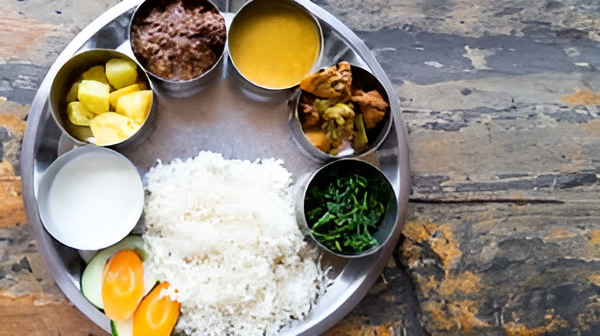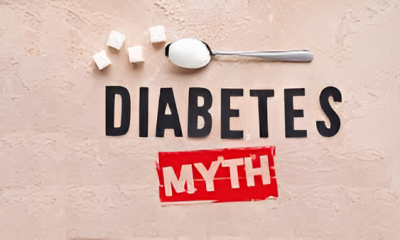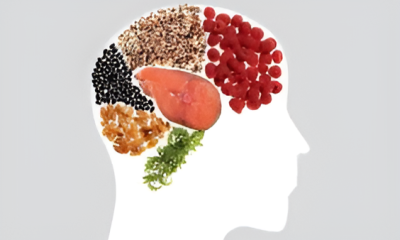Wellness
Nourish your body, Embrace a vibrant life with healthy food

As a dietitian, I’m constantly being asked, “What is the secret to a healthy way of life?” The thing is, there’s no single answer. Instead, it’s an exquisite tapestry woven of prudent choices, ingrained habits, and a healthy knowledge of the way our bodies thrive.
Picture your body as an incredible machine, wonderfully designed to perform at its best. Similar to any high-performance automobile, it needs the right fuel and tune-up. And that is where the miracle of nutrition steps in. More Than the Plate: A Whole-Person System
Food is definitely a centerpiece of a fit lifestyle. But it’s not the whole picture. Let’s consider some of the other essential elements:
* Movement is Medicine: Our bodies were designed to move. A bricks walk in the park, a dance class that brings your blood pressure up, or like a relaxing yoga class, Find activities that you enjoy and incorporate them into your regular routine. Experiment with a mix of cardiovascular activity and strength training to keep your body strong and healthy.
* The Power of Sleep: Sleep quality is not optional when it comes to physical and mental well-being. That’s when our bodies heal and recharge. Prioritize getting a consistent sleep schedule and calming bedtime routine.
* Hydration is Key: Virtually every aspect of the body requires water. From delivering nutrients to controlling temperature, being well-hydrated is key. Have a water bottle at your side and take sips throughout the day. Listen to your body’s thirst signals.
* Mindful Eating: It’s not what you eat, it’s how you eat. Practice mindful eating by paying attention to your hunger and fullness cues. Slowing down to taste every bite, and eating without distractions. This can establish a more balanced relationship with food and prevent overeating.
* Taking Care of Your Mind: Mental and emotional well-being go hand in hand with physical. Make sure to do activities that you love, learn ways to stress less through such activities as meditation or breathing deeply, and be around healthy relationships.
Small Steps, Big Impact
Beginning a lifestyle change doesn’t necessarily involve dramatic changes overnight. Actually, small, sustainable changes are most likely to work. Attempt to introduce one or two new healthy habits at a time and gradually build up from there.
Listen to Your Body
Lastly, the perfect lifestyle is one that nourishes your unique body and mind. Pay attention to how activities and foods make you feel. Experiment with new things.Learn what is best for you, and be gentle with yourself in the process.
This journey to a healthy lifestyle is a marathon, not a sprint. Enjoy the journey, bask in your triumph. And remember that every healthy choice you make is an investment in your future health.
What are some of your favorite ways to fuel your body and mind? Share your thoughts in the comments below!

Mind & Soul
Healthy Habits That Transform Your Mind and Body

Good health goes beyond looks. It’s also about how you feel, think, and function day to day. Too many people concentrate on physical fitness without paying attention to mental well-being. But your body and mind are very closely linked. If you keep one healthy, the other is healthy as well. Establishing a few daily healthy habits that you stick with is enough to create vast change in both your mind and body. These things take time. But bit by bit, a bit at a time, and you’ll notice a huge difference soon enough. Let’s get to 10 healthy habits that can inspire both mental and physical transformation.
1. Start Your Day with Movement
Morning movement wakes up your brain and body. It energizes your energy, mood, and concentration for the rest of the day. You don’t have to do heavy exercise. A 15-minute walk or gentle stretching is enough. Regular movement keeps your mind sharp and your muscles strong. Exercise also increases endorphins, your body’s natural happy chemicals. Moving in the morning gives you a positive start that will continue all day.
2. Eat Whole Foods, Not Just Less Food
Instead of merely reducing calories, focus on eating more real, whole foods. Whole foods give your body what it needs. Some examples of these are fruits and vegetables, whole grains, lean proteins, and healthy fats. Avoid foods that have too much added sugar and artificial preservatives. Healthy eating powers your body and mind and provides you with more energy and better concentration. Healthy eating also satisfies hunger and keeps you full.
3. Drink More Water, Not Less Soda
Hydration affects everything: energy, concentration, mood, and physical function. Thirst is frequently confused with hunger. That leads to unnecessary snacking and fatigue. Try having a glass of water when you feel drained. Carry water with you and take small sips all day long to stay hydrated. Proper hydration helps digestion, improves skin tone, and improves intellectual performance.
4. Create a Sleep Schedule You Love
Sleep is necessary for physical and mental restoration. Without proper sleep, your body is unable to heal. Your brain also has a tough time concentrating and keeping stress at bay. Establish a bedtime routine that allows you to get a minimum of seven to nine hours of sleep. Try to avoid screens at least 30 minutes prior to bedtime. Establish a soothing bedtime routine that signals your body that it is time to relax. This can be reading, stretching, or listening to soothing music.
5. Practice Daily Gratitude and Positivity
Your mind controls your actions and your mood. Negative thoughts suck the energy out of you and make life harder. Spend a few minutes each day thinking about what is working. Keep a journal and note three things you are grateful for each morning. It is an easy habit that changes your attitude from stress to contentment. With practice, you start seeing the good in everything.
6. Establish Screen Time Limits and Take Digital Breaks
Too much screen time can damage your posture, sleep, and mental clarity. It leads to mindless scrolling and comparison too. Take regular breaks from devices during the day. Use that time to go for a walk, read, or catch up with someone face-to-face. Try to have one screen-free hour every day. Reducing screen time can improve concentration, decrease stress, and lead to improved sleep.
7. Connect With Others, Not Just Online
Humans are social in nature. Even brief interactions with family or friends can brighten your day. Face-to-face social relationships correlate with longer life and better mental health. Don’t just connect via social media. Plan a visit with loved ones on a regular basis. Be a part of a club, participate in events, or volunteer locally. These interactions create support and meaning.
8. Practice Mindfulness and Deep Breathing
Mindfulness is focusing solely on the present. It keeps you calm and helps you make better choices. Deep breathing soothes your nerves, lowers your heart rate, and clarifies your mind. You can be mindful at any time—while eating, walking, or listening. Simply observe your breath and senses. Even five minutes a day will make a big difference.
9. Set Small Goals and Celebrate Progress
Substantial changes don’t take place suddenly. Start with small, achievable goals that fit your lifestyle. These goals steer and encourage you. For example, aim to walk for 10 minutes daily, drink an extra glass of water, or journal weekly. Celebrate your Progress, regardless of how small it can look. Little victories build confidence and motivate you onward.
10. Make Time for Interests and Creativity
Your brain needs creativity and enjoyment, not work and tension. Hobbies keep your mind happy and sharp. Paint, write, cook, garden—do what gives you energy. Creative activities unwind and let you express yourself. Make hobbies a part of your week, even if it’s only 15 minutes.
Healthy habits are more than exercising and eating well. They’re about self-esteem, balance, and keeping well over a period of years.
Start with a single healthy habits and then add to it. Be kind to yourself, and focus on Progress, not perfection. It is not about doing everything differently overnight but about becoming stronger and happier each day. When your body and mind are well cared for, everything else is improved—your energy, confidence, concentration, and happiness. Start today, and small habits can create big change.
Body and Health
Immune System Boost: Natural Ways to Strengthen Your Child

A strong immune system keeps your child healthy, fights infections, and grows healthy. Children are exposed to germs every day—at school, on the playground, and even at home. Encouraging your child to have a healthy defence system is one of the greatest gifts you can give. And here’s the best part: You don’t need to rely on costly supplements. A few good habits and easy changes can make all the difference.
Start with a Balanced, Colorful Diet
Your child’s food has an immense effect on how effective their immune system is. A plate full of colorful food translates into greater nutrient intake. Vegetables and fruits are rich in vitamins, antioxidants, and minerals that combat infections. Give them oranges, carrots, spinach, strawberries, bell peppers, and sweet potatoes. They contain vitamins A, C, and E. These enhance immunity and allow white blood cells to function effectively. Don’t overlook protein. Include everything like eggs, chicken, lentils, beans, yoghurt, and nuts. These allow the body to produce immune cells and heal more quickly when sick. Don’t use too much sugar. Sugar slows down white blood cells and weakens the immune system. Offer natural treats, like fruit, rather than cookies or soda.
Sleep High to Start Every Night
Kids need more sleep than adults. A well-rested body is better equipped to ward off germs. Sleep reduces the level of natural killer cells, which help in warding off viruses. Create a consistent bedtime routine and stick to it. Steer clear of screen time an hour prior to bedtime. Ensure their bedroom is dark, quiet, and calm to sleep through. Pre-school children need 10–12 hours of rest, and school children need 9–11 hours. If your child is sleeping well, they will wake up feeling refreshed and be ready to play and learn.
Promote Regular Physical Activity
Exercise improves immunity by aiding circulation and suppressing inflammation when your child is active, immune cells circulate more freely and do their work better.
Kids must have at least one hour of active playtime daily—biking, running, swimming, dancing, or even trampoline jumping does the trick.
Even casual outdoor play is beneficial. Sunlight gives the body vitamin D, which boosts immune function and cuts down on the risk of infections. It takes just 15–20 minutes of outdoor time.
Make Handwashing a Fun Habit
Encouraging children to wash their hands can stop germs from spreading. Hand washing is the easiest means of avoiding illness. Encourage your child to wash hands before eating, after visiting the bathroom, and after playing outdoors or with pets. Use warm water and soap. Wash for at least 20 seconds—sing the “Happy Birthday” song twice as a good gauge. Make it enjoyable, or employ colorful soaps and fun towels. If it’s enjoyable, they’ll do it all the time without the pestering.
Assist in Lessening Stress and Encouraging Happy Habits
Constant stress will weaken the immune system. Kids also feel stress, even though they don’t talk about it. Create a serene, loving environment. Permit them to express their ideas and feelings. Listen to them without criticism. Kindly ask them to play, have fun, and learn. Reading, drawing, music, and pet time can calm the mind. Happy children are healthy children. Mindfulness and breathing exercises help children handle stress more easily. Try doing some breathing exercises together before bed.
Keep Up to Date on Vaccinations
Vaccines build up the immune system ahead of time for certain diseases before they get there. Staying current on recommended vaccines protects your child and others around them. Follow your pediatrician’s recommendations for the vaccine schedule. Avoid missing or delaying injections unless instructed otherwise by your physician. Vaccines are safe and proven to avert serious illnesses like measles, influenza, and pneumonia. They provide your child with extra protection while they develop.
Limit Screen Time and Promote Face-to-Face Play
Excess screen time leads to poor sleep, reduced exercise, and increased stress. These harm immune function in the long term. Educate board games, blocks, or imaginative play over tablets and TV. Sibling or friend play creates social skills and happy hearts. The more they exercise, laugh, and hang out, the healthier their bodies become. Real play is a secret agent of healthy immunity.
Healthy Gut
About 70% of the immune system is in the gut. A healthy gut means a healthier immune system in general. Feed your child high-fiber foods, such as fruits, vegetables, oats, and whole grains. These encourage good bacteria growth in the gut. Supplement with probiotics, such as yoghurt or fermented foods such as kefir or miso soup. Avoid unnecessary antibiotics, which kill off good and bad bacteria. If your child is having an upset stomach, it is generally best to consult a . A healthy gut is the basis of good health.
Stay Hydrated, Especially on Hot Days
Water flushes out toxins and keeps the body in good working condition. Dehydration may slow down the immune system. Ensure that your child has lots of water every day. Please give them a colorful water bottle to bring with them and refill. Quit the fizzy drinks, such as soda or juice boxes. Have water, milk, or produce your own smoothies using real fruit and yoghurt instead.
Lead by Example
Children learn by example. If you eat well, exercise often, and wash your hands often, they’ll likely do the same too. Engage the family in healthy living. Cook together, go for a walk, and promote healthy living as a family. Building a strong immune system isn’t about perfection. It’s about consistent, small steps that add up over time.
Raising a healthy child with a robust immune system is not so hard. It’s all about making daily choices, loving them, and giving them lots of attention. Simply give them good food, adequate sleep, active play, and emotional care. It’s the simple habits that keep you going a long way. They’ll not only be healthier but also happier and more confident. Start today, and your child’s body will reward you for many years to come.
Body and Health
How to Create a Balanced Diet for a Healthy Life

Good health begins with what you eat every day. Being on a diet is different from eating lesser food. It is all about eating the correct food in the right amounts. Your body needs nutrients in order to grow, work, and stay healthy. A balanced diet gives your body all that it requires to function at its optimal level. Healthy eating will improve how you feel, concentrate better, and feel more energetic during the day. This article will show you how to create a balanced diet by means of simple principles and wholesome foods.
Why a Balanced Diet for Your Body
Your body requires fuel each day to move, think, and grow. Food supplies that fuel by way of nutrients. Nutrients consist of carbohydrates, proteins, fats, vitamins, and minerals. Each of the nutrients plays a unique role in keeping your body healthy and functioning. If you lack one nutrient in your diet, your body cannot function well. Too much of any food group can also cause problems. That’s why you need balance. A well-balanced diet avoids disease, keeps your immune system healthy, and helps develop your brain, especially in children.
The Five Food Groups You Need to Eat Every Day
Every good meal is made up of five broad food groups. They include fruits, vegetables, grains, protein, and dairy. They all offer varying nutrients that your body needs. You will be strong and healthy if you consume food from all the five categories daily. Below is a description of each group and how to incorporate it in your meals.
1. Fruits – Natural Sources of Vitamins and Fiber
Fruits are full of vitamins, fibre, and antioxidants. They help your body fight infection and repair tissues. Good fruits include apples, bananas, oranges, mangoes, and berries. Fresh fruits are preferable to processed or tinned fruits. Choose whole fruits rather than fruit juice, which contains extra sugar. Have at least two portions of fruits every day. A portion can be an apple or a cup of chopped fruit. Fruits are great to be consumed as snacks, with breakfast, or post-meals.
2. Vegetables – Strengthen Your Immune and Digestive System
Vegetables provide fibre, vitamins, and minerals that help in digestion and enhance immunity. Green leafy vegetables like spinach, kale, and lettuce are very healthy. Carrots, pumpkins, cucumbers, and broccoli are some of the good ones too. Try to include a variety of coloured vegetables every day. Different colours have different nutrients. Attempt to have at least three servings a day. A serving is one cup raw vegetables or half a serving cooked vegetables. Steam them or lightly cook them to maintain the nutrients.
3. Grains – The Body’s Primary Source of Energy
Grains are the primary source of energy for the body. Whole grains like brown rice, oats, and whole wheat contain more fibre than white bread or rice. Fiber satiates and facilitates digestion. You need to eat four to six servings of grains daily. One serving is a slice of whole grain bread, half a bowl of cooked rice, or a bowl of cereal. Limit foods with refined flour and added sugars, including pastries and white bread.
4. Protein – Growth and Repair
Protein builds muscles, fixes tissue, and develops a healthy immune system. Sources of protein include lean meats, chicken, fish, eggs, beans, lentils, tofu, and nuts. If you don’t eat meat, plant protein is an excellent alternative. Eat two or three portions of protein per day. One serving size is a boiled egg, a serving grilled chicken, or a cup of beans. Don’t eat fried and processed foods like sausages or nuggets.
5. Dairy – Builds Strong Bones and Teeth
Dairy foods give your body calcium and vitamin D, which help build strong bones and teeth. Milk, cheese, and yoghurt are the best sources. Choose low-fat or fat-free milk whenever you can. If you cannot drink milk, use lactose-free or calcium-fortified soy milk. One dairy serving can be a cup of milk, a slice of cheese, or a small container of yoghurt. Try to include at least two or three servings daily.
How to Plan a Balanced Plate for Every Meal
A straightforward way to plan a well-balanced meal is through the use of the “Healthy Plate” method. Divide your plate into four portions. Vegetables and fruits should occupy half of your plate. One quarter should be grains like rice or bread. The last quarter should be a protein source like chicken or beans. Add milk in a glass or yoghurt in a cup on the side. This simple rule has you eat all the food groups necessary in one meal. Do not skip meals and eat at set times daily.
Foods to Limit for a Healthy Body
A balanced diet also means not consuming bad food. Try to eat fewer sugary snacks, fizzy drinks, and fried food. These foods have empty calories, and they do not provide good nutrients. High fat and sugar can lead to weight gain, lethargy, and other health issues. Instead, drink water, eat fruits, and eat nuts or yoghurt as snacks. Choose home cooking over fast food whenever you can.
Daily Schedule to Keep Your Diet in Balance
Right eating is not just about any particular meal. It is about what you eat throughout the day. Start your day with a healthy breakfast. Incorporate fruits and protein in your lunch. Have a light dinner of vegetables and whole grains. Drink a lot of water during the day. Avoid eating late nights. Prepare your meals at home to have control over the ingredients and portions. If you feel hungry between meals, eat nutritious snacks like fruits, nuts, or whole-grain crackers.
Construct a Healthier Life with Improved Food Choices
One of the strongest weapons for a healthy life is a balanced diet. It gives your body the fuel to grow, move, think, and fight diseases. Your body gets the nutrients when you consume fruits, vegetables, cereals, protein, and milk daily. Avoid junk food, drink lots of water, and have regular meals. Start forming your balanced diet today. Your future will thank you for the right choice.
-

 Healthy food4 weeks ago
Healthy food4 weeks agoHealthy Vegan: Fact vs. Fiction
-

 Healthy food3 weeks ago
Healthy food3 weeks agoChia Seeds: Tiny Grains With Giant Power
-

 Mind & Soul3 weeks ago
Mind & Soul3 weeks agoThe One-Minute Calm: How Breathing Can Change Everything!
-

 Healthy food2 weeks ago
Healthy food2 weeks agoFood to Fight Depression and Anxiety: What to Eat to Feel Better
-

 Personal Development2 weeks ago
Personal Development2 weeks agoSchedule Overload: How to Handle a Busy Life Like a Pro
-

 Mind & Soul3 weeks ago
Mind & Soul3 weeks agoUnderstanding Anxiety: A Guide to the Different Types
-

 Mind & Soul3 weeks ago
Mind & Soul3 weeks agoDistance Isn’t the End: 10 Ways to Keep Your Love Alive
-

 Body and Health3 weeks ago
Body and Health3 weeks ago8 Diabetes Myths You Shouldn’t Believe




























